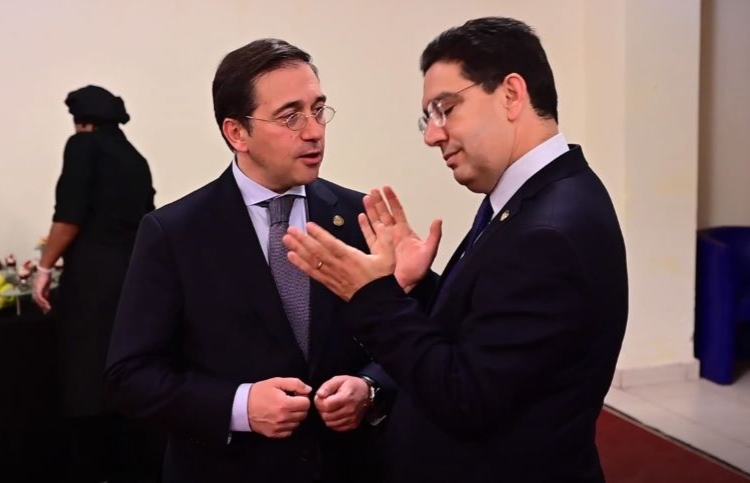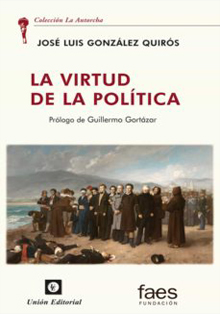Eduardo González
The Minister of Foreign Affairs, José Manuel Albares, held yesterday his eighth bilateral meeting (the fourth in just a week) with his Moroccan counterpart, Nasser Bourita, in the framework of “the new and excellent relationship between the two countries”.
According to Foreign Ministry sources informed The Diplomat, Bourita took advantage of a stopover in Madrid to make his second visit to Spain in three years, after participating last week in Barcelona in the VII Regional Forum of the Union for the Mediterranean (UfM) and in the EU-Southern Neighborhood ministerial meeting. The objective of yesterday’s meeting, according to the same sources, was to “make further progress” on the details of the High Level Meeting (RAN, for its acronym in Spanish) and to address “bilateral and Mediterranean issues within the new and excellent relationship between the two countries”.
The two ministers have already met up to eight times, between bilateral and informal meetings. Albares came to office in July 2021, when the serious bilateral crisis between Spain and Morocco (caused by Spain’s decision to take in the leader of the Polisario Front, Brahim Ghali, on humanitarian grounds) was in full swing. In the first months, the two held several telephone conversations to try to put bilateral relations back on track and in one of them, precisely the first one (at the end of September 2021, at the height of the diplomatic crisis), the two ministers committed to hold “a face-to-face meeting soon”, but that commitment came to nothing almost immediately.
The turning point came last March, with the decision of the Spanish government to accept the autonomy plan for Western Sahara and the adoption, on April 7 in Rabat, of a bilateral roadmap between President Pedro Sanchez and King Mohamed VI to relaunch bilateral relations. In the new circumstances, the first meeting between Albares and Bourita took place on May 10 last, on the occasion of their participation in the meeting of the Global Coalition against Daesh, held in Marrakech. On that occasion, the Spanish minister announced the beginning of a “new stage” in relations in which “there is no room for unilateral acts or crises”.
The two met again two days later in Marrakech, where they agreed on the “political decision” to reopen the borders with Ceuta and Melilla after being closed for more than two years due to the pandemic and the diplomatic crisis. The third meeting took place in September, in New York, on the margins of the 77th session of the United Nations General Assembly. At that meeting, the two ministers reached several agreements to hold the RAN in November and to open in January the passage of goods through the land customs posts (which will involve the reopening of the Melilla customs office and the opening of the first customs office in Ceuta).
Albares and Bourita met for the fourth time on November 12, at the Spanish Embassy in Paris, on the occasion of their participation in the fifth edition of the Paris Peace Forum. On this occasion, the two returned to the RAN, after the Moroccan minister himself warned in October that the bilateral meeting would be held in early 2023, instead of November, as had been agreed at the previous meeting.
The fifth meeting took place on November 22 in Fez, on the occasion of the celebration of the ninth Global Forum of the United Nations Alliance of Civilizations in this Moroccan city. After this meeting, Albares told the press that the dates for the celebration of the RAN were pending “the agendas of each one, both of the President of the Government and the King of Morocco, which are especially burdened by the international reality”.
Since that meeting, the two ministers have met on three other occasions, all of them in Spain: two in Barcelona (before and in the margins of the UfM Regional Forum and the EU-Southern Neighbourhood meeting) and yesterday’s meeting in Madrid. During their meeting last Friday in Barcelona, José Manuel Albares and Nasser Bourita discussed progress on the roadmap, the opening of commercial traffic across the land borders and the holding of the High Level Meeting, which they both dated for “late January or early February” and that will take place in Morocco.
The last RAN between Spain and Morocco was held in 2015 and the next one had been scheduled, in principle, in December 2020, but has suffered several postponements because of the COVID-19 pandemic and the deep bilateral crisis. Finally, the letter sent by Sanchez to Mohamed VI in which he affirmed that the autonomy plan for Western Sahara constitutes “the most serious and realistic basis” laid the groundwork for the recovery of diplomatic relations and paved the way for the holding of the High Level Meeting, mentioned in the Joint Declaration of April 7.







